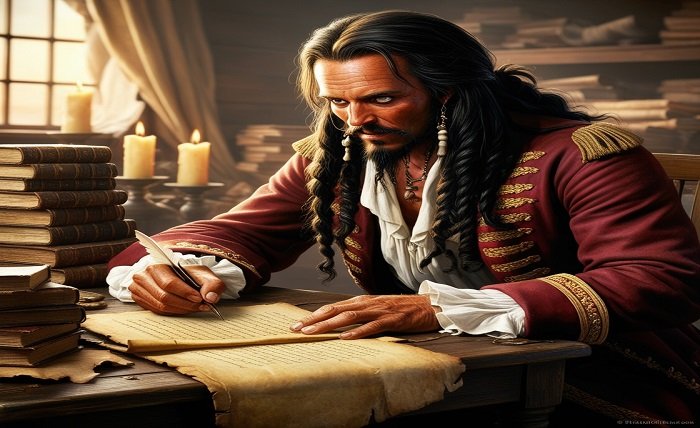Introduction
The moniker “blackbeard writing” conjures up thoughts of a terrifying, enormous pirate who terrorized the waterways around the American colonies and the Caribbean throughout the 18th century. Blackbeard, whose real name was Edward Teach (or Thatch), is a legendary figure in pirate mythology, distinguished by his dreadlocked beard and intimidating demeanor. Even though his ruthless actions are well known, his legacy goes beyond the gory conflicts and audacious raids.
Real Blackbeard Writing History
It’s crucial to define blackbeard writing before delving into how his legacy has impacted. In the early 18th century, Edward Teach (also written Thatch) was a well-known English pirate who sailed the eastern coast of the American colonies and the West Indies. The Queen Anne’s Revenge, his commanding ship, and his scary look—which included tying slow-burning fuses into his beard to produce a cloud of smoke that gave him the appearance of a devil—are possibly what made him most renowned.
The Influence of Pirate Stories
Storytelling has always been captivated by pirates. Their freedom, disobedience, and the romanticism of the high seas have all been sources of inspiration for authors. With his theatrical presence and larger-than-life persona, blackbeard writing in particular is a character that encourages colorful, dramatic writing. In fiction, pirates are frequently portrayed as being chaotic and defiant, and Blackbeard is one of the most interesting real-life figures who exhibit these qualities.
Blackbeard in Historical Accounts
Blackbeard’s legend was greatly influenced by early accounts of him, including those written by the British naval commanders and colonial officials who opposed him. These narratives were frequently written from the viewpoint of the victorious parties, who aimed to put an end to pirates and preserve peace in the colonies. According to these documents, blackbeard writing was a dangerous outlaw who made his adversaries fearful.
The Romanticized Pirate: Fictional Blackbeard
As time went on, Blackbeard grew to be a fascinating character for fiction authors. The notion of pirates as daring outlaws became the basis for many stories written by authors, and blackbeard writing became the quintessential example of this type. The persistent legacy of pirate storytelling can be attributed to authors such as James Fenimore Cooper and Robert Louis Stevenson, whose writings have influenced the contemporary perception of the pirate.
The Dark Side of Blackbeard: Villainy in Writing
Blackbeard’s malevolent traits are examined in greater detail in books like Richard Zacks’ The Pirate Hunter. The narrative explores the conflict between Blackbeard and the colonial authority, presenting his piracy as a reaction to the corrupt political and social structures of his era as well as a means of finding wealth. blackbeard writing is a complicated literary figure because of his dual roles as a rebellious icon and a villain.
Blackbeard’s Impact on Contemporary Media
Writers, filmmakers, and game developers are still captivated by blackbeard writing in the twenty-first century. His persona has made appearances in comic books, video games, TV series, and films. In the Pirates of the Caribbean franchise, Ian McShane’s portrayal of Blackbeard, the main antagonist in Pirates of the Caribbean: On Stranger Tides (2011), is one noteworthy example.
Blackbeard and Storytelling Techniques
Blackbeard’s legacy is fundamentally linked to the craft of storytelling. blackbeard writing has been influenced by the stories that have been written about him, from the oral traditions of sailors telling stories about their adventures to the written word that preserved his image. Stories that blend history and myth, reality and fiction, have been told about him for decades.
Blackbeard as a Rebellious Symbol
The pirate is frequently portrayed as a symbol of revolt in Blackbeard’s works. Many writers have found blackbeard writing to be a timeless emblem of freedom because of his embracing of lawlessness, contempt of authority, and refusal to follow social norms. In literature, pirates frequently symbolize a liberation from the limitations of society and a return to a more primitive way of life in which survival is determined by one’s strength and guile.
In Songs and Poetry, Blackbeard
The popular folk song “blackbeard writing,” which describes Blackbeard’s adventures and his terrifying reputation, serves as one example. Despite their occasional exaggeration, these songs are crucial in preserving Blackbeard’s memory and influencing how subsequent generations view the pirate. In this way, Blackbeard’s legacy endures through music and oral traditions in addition to being found in books and films.
Conclusion
There is no denying Blackbeard’s impact on literature, which has endured for centuries and continues to motivate authors of all stripes. His legend remains one of the most fascinating in pirate lore, despite historical and fictitious depictions. Regardless of whether he is seen as a hero, a villain, or a symbol of rebellion, blackbeard writing legendary status in literature and the media guarantees that his name will never be forgotten.
FAQ
Who was Blackbeard in real life?
Edward Teach, sometimes known as Thatch, was an infamous pirate who lived in the Caribbean and off the American colonies in the early 1700s. He was known by the nickname blackbeard writing. He was notorious for his infamous ship, the Queen Anne’s Revenge, and his scary appearance, which included a slow-burning fuse in his beard.
What impact has Blackbeard had on contemporary narrative?
Innumerable authors, filmmakers, and game developers have drawn inspiration from blackbeard writing pirate heritage. His persona has been featured in video games like Assassin’s Creed IV: Black Flag, movies like Pirates of the Caribbean, and books. The ongoing interest in pirate mythology and insurrection in contemporary media is another indication of his influence.
What role does Blackbeard play in pirate fiction?
Blackbeard is the quintessential pirate—ruthless, gregarious, and defiant. His persona, which captures the charm and peril of pirate life, has impacted how pirates are portrayed in literature. Find out more information: phongsavanh bank ltd boiler room scam

